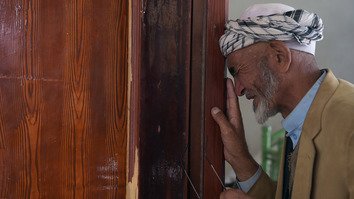KABUL -- Afghan officials, politicians and ordinary citizens from all walks of life are strongly condemning last week's attack on Shia Muslims in Kabul.
According to Kabul police, more than 30 people were killed in the November 20 suicide bombing at the Baqir-ul-Uloom Mosque, the latest in a series of attacks targeting the country's Shia community.
Worshippers nationwide carried out Arbaeen, marking the end of 40 days of mourning for Imam Hussain, grandson of the Prophet Muhammad (PBUH), amid tight security, Kabul police spokesman Basir Mujahid told media.
"But unfortunately a number of citizens held another ceremony in the aftermath of the Arbaeen ceremony, and a suicide bomber got inside the Baqir-ul-Uloom Mosque and detonated his explosives among tens of civilian participants," Mujahid told Salaam Times.
"The attack injured more than 80 people," Ismail Kawoosi, a spokesman for the Ministry of Public Health, told Salaam Times.
The mosque was crowded at the time of the attack, Ali Reza, 22, who was hospitalised for injuries, told Salaam Times.
"There were children and elders in the mosque," he said. "Nobody [around me] was alive."
"I saw all of them, dusty and bloody bodies spread across the floor," he said.
The "Islamic State of Iraq and the Levant" (ISIL) claimed responsibility.
An attack against Islam, humanity
Afghan leaders reacted with outrage.
President Ashraf Ghani expressed his condolences to the families of the victims and called the attack an unforgivable act carried out by Afghanistan's enemies.
The attack on sacred and religious places is evidence of the terrorists' enmity toward Islam and the people of Afghanistan, the president said in a statement.
"The act was aimed at bringing fractures among Afghan ethnicities," Ghani said.
Government CEO Abdullah Abdullah condemned the atrocity as well and sent his condolences to the bereaved families.
"This attack targeted innocent civilians -- including children -- in a holy place," he said via Twitter. "It is a war crime and an act against Islam and humanity."
"This attack is against religions, faiths, humanity, human ideologies and every human belief. This is a sign of barbarism and cruelty," he told media.
"While we mourn the loss of our loved ones, we must make sure to work for unity and avoid the enemy plots that divide us by categories," he said.
The attack was a great crime and the work of enemies of the Afghan people, Senate Chairman Fazal Hadi Muslimyar said.
He expressed his profound grief over the tragedy, which he called an "unpardonable crime".
Afghan Sunni, Shia remain united
Targeting worshipers inside a mosque deserves the strongest condemnation, Maulvi Qayamuddin Kashaf, chairman of the Afghanistan Ulema Council, said.
"The incident reflects the worst technique of the insurgents, which is using religion and sacred places like mosques as tools for launching terror attacks," he told Salaam Times.
"Killing innocent civilians and worshipers in the name of religion is totally against the spirit and principles of the holy religion of Islam," Kashaf said, adding that the terrorists use every opportunity to hurt more than a billion Muslims to consummate their own evil wishes.
The Afghan people will forever stand united, Hussain Ali Karbalaye, a shopkeeper in the area where the blast took place, said.
"These attacks are showing that ISIL is trying to wage war in the name of religion between different groups of the Muslim people of Afghanistan," he told Salaam Times.
Afghans are one nation united against insurgents, Humaira, a Kabul University student, said.
"Every Sunni is Shia and every Shia is Sunni here; there is no deference between us," she said. "We know our enemies. They don't want a united Afghanistan."

![Afghan security personnel November 21 gather after a suicide bombing that day at the Baqir-ul-Uloom Mosque in Kabul. ISIL claimed responsibility for the bombing, which killed more than 30 Shia gathered for a religious ceremony. [Shah Marai/AFP]](/cnmi_st/images/2016/11/23/6638-mosque-585_329.jpg)






